No reproduction in any form of this manual, in
whole or in part (except for brief quotation in critical
articles or reviews), may be made without written
authorization from NIKON CORPORATION.
En
The Nikon Guide to Digital Photography
with the
DIGITAL CAMERA
(
E
n
)
SB4B02(11)
6MBA1111-02
�
Product Documentation
The documentation for this product includes the manuals listed below.
Please be sure to read all instructions thoroughly to get the most from your
cam era.
Quick Start Guide
The Quick Start Guide takes you through the process of unpacking and
set ting up your Nikon digital camera, taking your fi rst photographs, and
trans fer ring them to your computer.
Guide to Digital Photography
The Guide to Digital Photography (this manual) provides complete op er at ing
in struc tions for your camera.
Reference CD
The ref er ence CD contains information on the software provided with
your camera. For information on view ing the reference CD, see the Quick
Start Guide.
CAUTION: Foreign Matter on the Low-Pass Filter
Nikon takes every possible precaution to pre vent foreign matter from com ing into
con tact with the low-pass fi lter during production and ship ping. The D70, how ev er,
is designed to be used with interchangeable lens es, and for eign matter may enter the
camera when lens es are removed or exchanged. Once inside the camera, this for eign
matter may adhere to the low-pass fi lter, where it may appear in photographs tak en
under cer tain con di tions. To prevent foreign matter from entering the camera, do not
exchange lenses in dusty environments. To pro tect the camera when no lens is in place,
be sure to replace the body cap pro vid ed with the camera, being care ful to fi rst remove
all dust and other foreign matter that may be ad her ing to the body cap.
Should foreign matter fi nd its way onto the low-pass fi lter, clean the low-pass fi lter as
instructed on pages 194–195 of this manual, or have the low-pass fi lter cleaned by
authorized Nikon ser vice per son nel. Pho to graphs affected by the presence of for eign
matter on the low-pass fi lter can be re touched us ing Nikon Capture 4 version 4.1 or
later (available separately) or the clean image options available in some third-party
im ag ing software.
�
How to Read This Manual
First, be aware of the warnings, cautions, and notices on pages ii–v.
Next, read “Overview” and “Getting to Know the
Camera” to fa mil iar ize your self with the con ven -
tions used in this man u al and the names of cam era
parts, then set up your cam era as de scribed in
“First Steps.”
Now you are ready to take photographs and
play them back. You can then try your hand
at creative composition as described in “Digital
Vari-Programs.”
Once you have mastered the basics of dig i tal
photography, you can read these sections for
complete in for ma tion on when and how to use
camera controls.
Overview
Getting to Know the Camera
First Steps
Basic Photography
Basic Playback
Digital Vari-Programs
Image Quality and Size
Sensitivity (ISO Equivalency)
White Balance
Optimizing Images
Choosing a Shooting Mode
Focus
Exposure
Flash Photography
Self-Timer Mode
Using the Remote Control
Two-Button Reset
Refer to these chapters for more on play back…
More About Playback
…on cam era menus and cus tom settings…
…on connecting to a com put er or TV…
Menu Guide
Connections
…on printing photos on a PictBridge printer…
Printing Photographs
…and on ac ces so ries and trou ble shoot ing.
Technical Notes
i
�
For Your Safety
To prevent damage to your Nikon product or injury to yourself or to others,
read the following safety precautions in their entirety before using this equip-
ment. Keep these safety instructions where all those who use the product
will read them.
The consequences that could result from failure to observe the precautions
listed in this section are indicated by the following symbol:
This icon marks warnings, information that should be read before using this
Nikon product to prevent possible injury.
WARNINGS
Do not look at the sun through the view-
fi nder
Viewing the sun or other strong light
source through the viewfi nder could
cause per ma nent visual im pair ment.
Turn off immediately in the event of
malfunction
Should you notice smoke or an un usu al
smell coming from the equip ment or
from the AC adapt er (avail able sep-
a rate ly), unplug the AC adapt er and
re move the battery im me di ate ly, tak-
ing care to avoid burns. Con tin ued
op er a tion could re sult in injury. After
re mov ing the bat tery, take the equip ment
to a Nikon-au tho rized service cen ter for
in spec tion.
Do not use in the presence of fl am-
ma ble gas
Do not use electronic equip ment in the
presence of fl ammable gas, as this could
result in ex plo sion or fi re.
Do not place strap around the neck of
an infant or child
Placing the camera strap around the
neck of an infant or child could result
in strangulation.
Do not disassemble
Touching the product’s internal parts
could result in injury. In the event of
a malfunction, the prod uct should be
re paired only by a qualifi ed tech ni cian.
Should the product break open as the
re sult of a fall or other ac ci dent, re move
the battery and/or AC adapt er and then
take the prod uct to a Nikon-au tho rized
ser vice cen ter for in spec tion.
Observe proper precautions when han-
dling batteries
Batteries may leak or explode if im-
prop er ly handled. Observe the fol low ing
pre cau tions when handling bat ter ies for
use in this product:
• Be sure the product is off before re-
plac ing the battery. If you are using an
AC adapter, be sure it is un plugged.
• Use only batteries approved for use in
this equipment. Do not mix old and new
batteries or batteries of different types.
• Do not at tempt to insert the battery
upside down or back wards.
• Do not short or disassemble the bat-
tery.
• Do not expose the battery to fl ame or
to excessive heat.
• Do not immerse in or expose to wa ter.
ii
�
• Replace the terminal cover when trans-
porting the battery. Do not transport
or store with metal objects such as
neck lac es or hair pins.
• Batteries are prone to leakage when
fully discharged. To avoid damage to
the prod uct, be sure to remove the bat-
tery when no charge re mains.
• When the battery is not in use, at tach
the terminal cover and store in a cool
place.
• Immediately after use, or when the
prod uct is used on battery power for
an ex tend ed period, the bat tery may
become hot. Before re mov ing the bat-
tery, turn the camera off and al low the
battery to cool.
• Discontinue use immediately should you
notice any changes in the bat tery, such
as dis col or a tion or de for ma tion.
Use appropriate cables
When connecting cables to the in put and
output jacks, use only the ca bles pro-
vid ed or sold by Nikon for the pur pose,
to main tain com pli ance with prod uct
reg u la tions.
Keep out of reach of children
Particular care should be tak en to pre vent
infants from putting the bat tery or other
small parts into their mouths.
Removing memory cards
Memory cards may become hot dur-
ing use. Observe due cau tion when
re mov ing memory cards from the
cam era.
CD-ROMs
The CD-ROMs on which the soft ware
and manuals are dis trib ut ed should not
be played back on audio CD equip ment.
Playing CD-ROMs on an audio CD play er
could cause hear ing loss or dam age the
equip ment.
Observe caution when using the fl ash
Using the fl ash close to your sub ject’s
eyes could cause tem po rary vi su al
im pair ment. Par tic u lar care should
be observed if pho to graph ing in fants,
when the fl ash should be no less than
one meter (39˝) from the sub ject.
When using the viewfi nder
When operating the diopter ad just ment
control with your eye to the viewfi nder,
care should be tak en not to put your
fi n ger in your eye ac ci den tal ly.
Avoid contact with liquid crystal
Should the monitor break, care should
be tak en to avoid injury due to bro ken
glass and to pre vent liq uid crystal from
the mon i tor touch ing the skin or en ter ing
the eyes or mouth.
iii
�
Notices
• No part of the manuals included with
this product may be reproduced, trans-
mitted, transcribed, stored in a retrieval
system, or translated into any language
in any form, by any means, without
Nikon’s prior written permission.
• Nikon reserves the right to change the
specifi cations of the hardware and soft-
ware described in these manuals at any
time and without prior notice.
• Nikon will not be held liable for any
damages resulting from the use of this
product.
• While every effort has been made to
ensure that the information in these
manuals is accurate and complete, we
would appreciate it were you to bring
any errors or omissions to the attention
of the Nikon representative in your area
(address provided separately).
FOR HOME OR OFFICE USE
Tested To Comply
With FCC Standards
Notice for customers in the U.S.A.
Federal Communications Commission (FCC) Radio Frequency Interference Statement
This equipment has been tested and found
D70
to comply with the limits for a Class B digi-
tal device, pursuant to Part 15 of the FCC
rules. These limits are designed to provide
reasonable protection against harmful
interference in a residential installation.
This equipment generates, uses, and can
radiate radio frequency energy and, if not
installed and used in accordance with the
instructions, may cause harmful interfer-
ence to radio communications. However,
there is no guarantee that interference
will not occur in a particular installation.
If this equipment does cause harmful in-
terference to radio or television reception,
which can be determined by turning the
equipment off and on, the user is encour-
aged to try to correct the interference by
one or more of the following measures:
• Reorient or relocate the receiving an-
CAUTIONS
Modifi cations
The FCC requires the user to be notifi ed
that any changes or modifi cations made to
this device that are not expressly approved
by Nikon Corporation may void the user’s
authority to operate the equipment.
Interface Cables
Use the interface cables sold or provided
by Nikon for your equipment. Using other
interface cables may exceed the limits of
Class B Part 15 of the FCC rules.
Notice for customers in the State of California
WARNING: Handling the cord on this
product will expose you to lead, a chemical
known to the State of California to cause
birth defects or other reproductive harm.
Wash hands after handling.
Nikon Inc.,
1300 Walt Whitman Road, Melville, New York
11747-3064, U.S.A. Tel.: 631-547-4200
tenna.
• Increase the separation between the
equipment and receiver.
• Connect the equipment into an outlet
on a circuit different from that to which
the receiver is connected.
• Consult the dealer or an experienced
radio/television technician for help.
iv
�
Notice for customers in Canada
CAUTION
This class B digital apparatus meets all re-
quirements of the Canadian Interference
Causing Equipment Regulations.
ATTENTION
Cet appareil numérique de la classe B res-
pecte toutes les exigences du Règlement
sur le matériel brouilleur du Canada.
Notice Concerning Prohibition of Copying or Reproduction
Note that simply being in possession of material that has been digitally copied or reproduced
by means of a scanner, digital camera or other device may be punishable by law.
Items prohibited by law from being
Cautions on certain copies and re-
copied or reproduced
Do not copy or reproduce paper money,
coins, securities, government bonds, or
local government bonds, even if such
copies or reproductions are stamped
“Sample.”
The copying or reproduction of paper
money, coins, or securities which are
circulated in a foreign country is pro-
hibited.
Unless the prior permission of the
government has been obtained, the
copying or reproduction of unused post-
age stamps or post cards issued by the
government is prohibited.
The copying or reproduction of stamps
issued by the government and of cer-
tifi ed documents stipulated by law is
prohibited.
productions
The government has issued cautions on
copies or reproductions of securities is-
sued by private companies (shares, bills,
checks, gift certifi cates, etc.), commuter
passes, or coupon tickets, except when
a minimum of necessary copies are to be
provided for business use by a company.
Also, do not copy or reproduce pass-
ports issued by the government, licenses
issued by public agencies and private
groups, ID cards, and tickets, such as
passes and meal coupons.
Comply with copyright notices
The copying or reproduction of copy-
righted creative works such as books,
music, paintings, woodcut prints, maps,
drawings, movies, and photographs is
governed by national and international
copyright laws. Do not use this product
for the purpose of making illegal copies
or to infringe copyright laws.
Trademark Information
Apple, the Apple logo, Macintosh, Mac OS, Pow er Macintosh, and PowerBook are reg is tered trade marks of Apple
Computer, Inc. Power Mac, iMac, and iBook are trade marks of Ap ple Com put er, Inc. Microsoft and Win dows are
reg is tered trade marks of Microsoft Corporation. Pentium is a trade mark of Intel Cor po ra tion. CompactFlash is a
trade mark of SanDisk Cor po ra tion. Microdrive is a registered trademark of Hitachi Global Storage Technologies in
the United States and/or other countries. Lexar Me dia is a trade mark of Lexar Me dia Cor po ra tion. PictBridge is a
trademark. All oth er trade names men tioned in this man u al or the oth er doc u men ta tion pro vid ed with your Nikon
prod uct are trade marks or reg is tered trade marks of their re spec tive holders.
v
�
Table of Contents
For Your Safety ................................................................................................ ii
Notices ............................................................................................................ iv
Introduction....................................................................................................... 1
Overview .......................................................................................................... 2
Getting to Know the Camera.......................................................................... 3
First Steps ......................................................................................................... 13
Attaching the Camera Strap............................................................................. 13
Inserting Batteries ............................................................................................ 14
Basic Setup ...................................................................................................... 16
Attaching Lenses.............................................................................................. 18
Inserting Memory Cards ................................................................................... 20
Tutorial............................................................................................................... 23
Basic Photography ........................................................................................... 24
................................................................ 24
Step 1—Rotate the Mode Dial to
Step 2—Ready the Camera .............................................................................. 24
Step 3—Adjust Camera Settings ...................................................................... 26
Step 4—Frame a Photograph ........................................................................... 27
Step 5—Focus.................................................................................................. 28
Step 6—Take the Photograph .......................................................................... 30
Basic Playback .................................................................................................. 31
Digital Vari-Programs ...................................................................................... 32
Taking Photographs.......................................................................................... 35
When to Use Shooting Options........................................................................ 36
Using Camera Menus....................................................................................... 39
Image Quality and Size.................................................................................... 41
Image Quality .................................................................................................. 41
Image Size ....................................................................................................... 43
Sensitivity (ISO Equivalency)............................................................................ 46
White Balance .................................................................................................. 48
Fine-Tuning White Balance ............................................................................... 50
Preset White Balance........................................................................................ 52
Optimizing Images........................................................................................... 56
Customizing Image Enhancement Options ....................................................... 57
Choosing a Shooting Mode............................................................................. 62
Focus ................................................................................................................. 64
Focus Mode ..................................................................................................... 64
Focus Area Selection ........................................................................................ 66
Focus Lock ....................................................................................................... 70
The AF-Assist Illuminator.................................................................................. 72
Getting Good Results with Autofocus .............................................................. 73
Manual Focus .................................................................................................. 74
vi
�
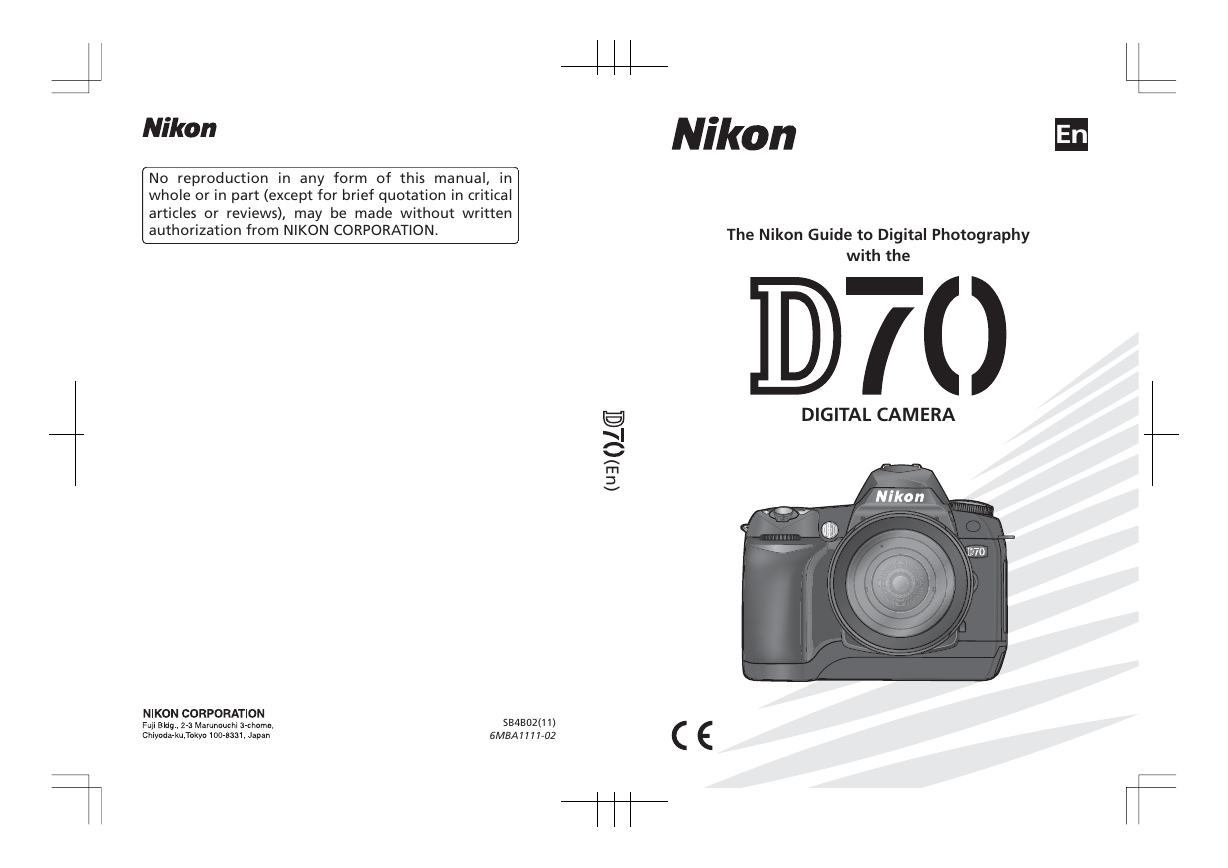
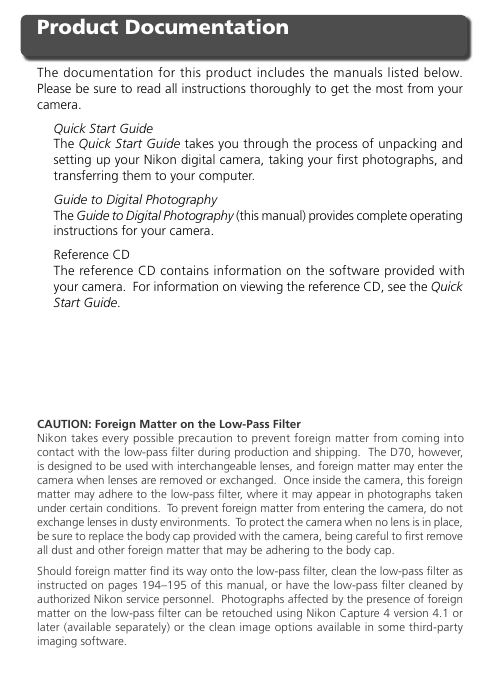
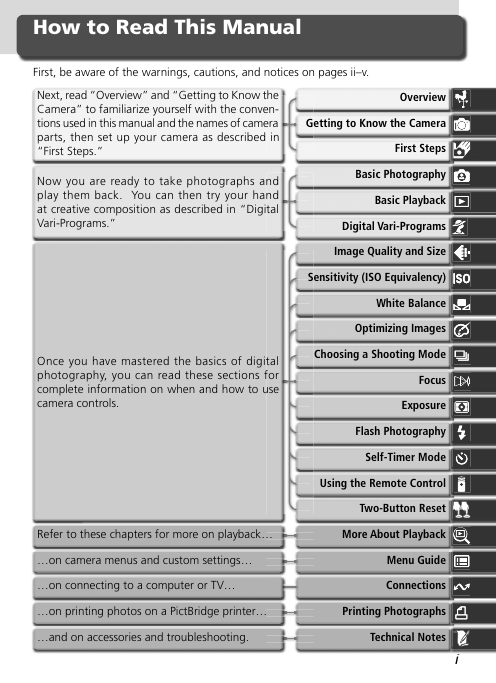
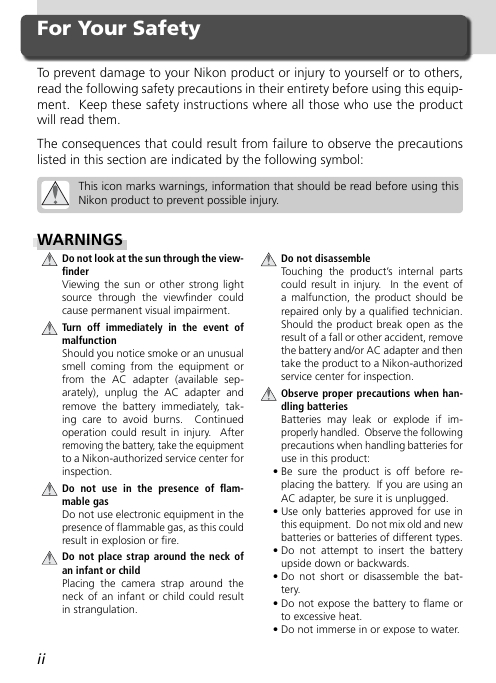
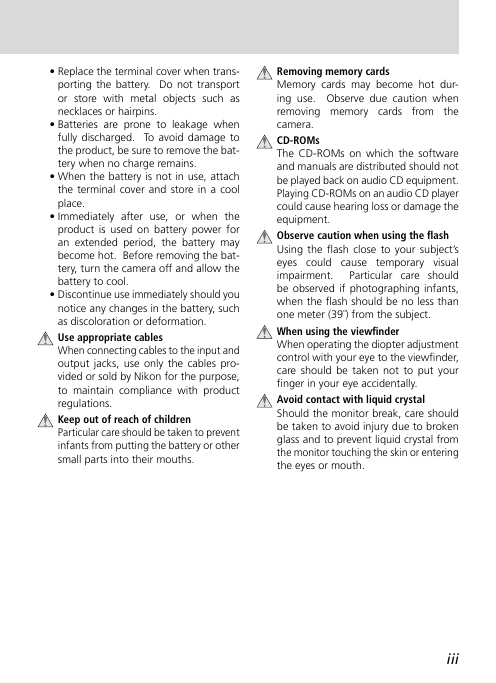
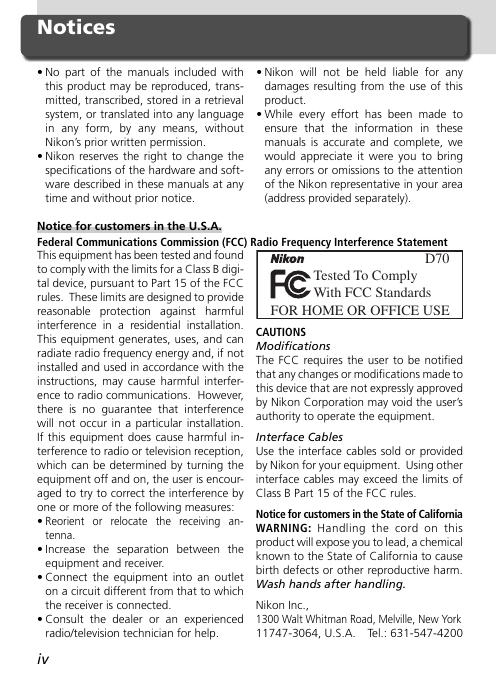
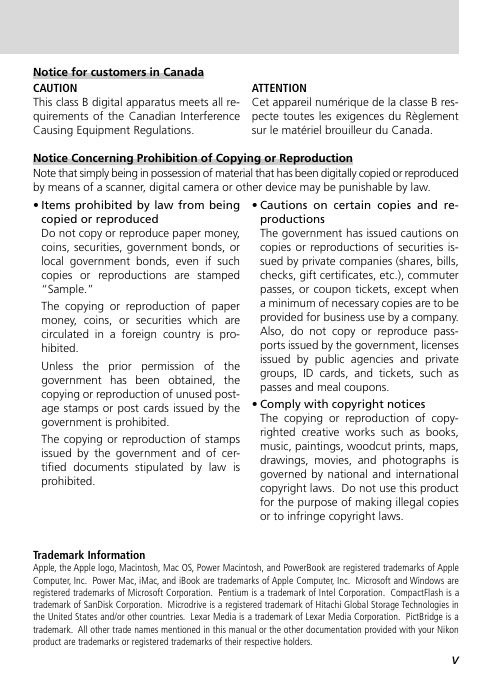
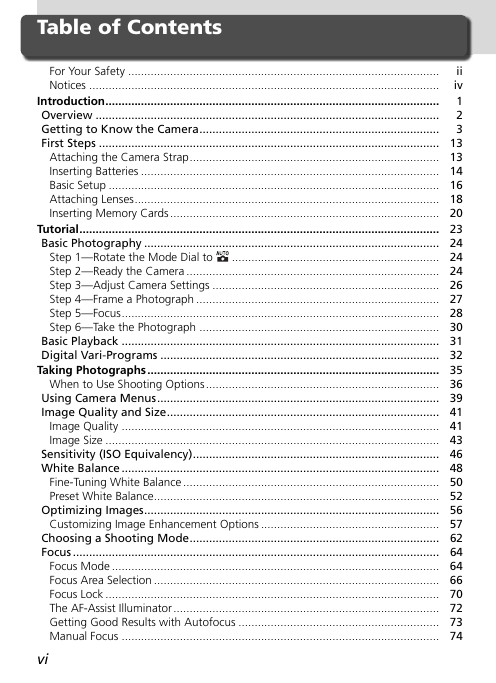








 2023年江西萍乡中考道德与法治真题及答案.doc
2023年江西萍乡中考道德与法治真题及答案.doc 2012年重庆南川中考生物真题及答案.doc
2012年重庆南川中考生物真题及答案.doc 2013年江西师范大学地理学综合及文艺理论基础考研真题.doc
2013年江西师范大学地理学综合及文艺理论基础考研真题.doc 2020年四川甘孜小升初语文真题及答案I卷.doc
2020年四川甘孜小升初语文真题及答案I卷.doc 2020年注册岩土工程师专业基础考试真题及答案.doc
2020年注册岩土工程师专业基础考试真题及答案.doc 2023-2024学年福建省厦门市九年级上学期数学月考试题及答案.doc
2023-2024学年福建省厦门市九年级上学期数学月考试题及答案.doc 2021-2022学年辽宁省沈阳市大东区九年级上学期语文期末试题及答案.doc
2021-2022学年辽宁省沈阳市大东区九年级上学期语文期末试题及答案.doc 2022-2023学年北京东城区初三第一学期物理期末试卷及答案.doc
2022-2023学年北京东城区初三第一学期物理期末试卷及答案.doc 2018上半年江西教师资格初中地理学科知识与教学能力真题及答案.doc
2018上半年江西教师资格初中地理学科知识与教学能力真题及答案.doc 2012年河北国家公务员申论考试真题及答案-省级.doc
2012年河北国家公务员申论考试真题及答案-省级.doc 2020-2021学年江苏省扬州市江都区邵樊片九年级上学期数学第一次质量检测试题及答案.doc
2020-2021学年江苏省扬州市江都区邵樊片九年级上学期数学第一次质量检测试题及答案.doc 2022下半年黑龙江教师资格证中学综合素质真题及答案.doc
2022下半年黑龙江教师资格证中学综合素质真题及答案.doc